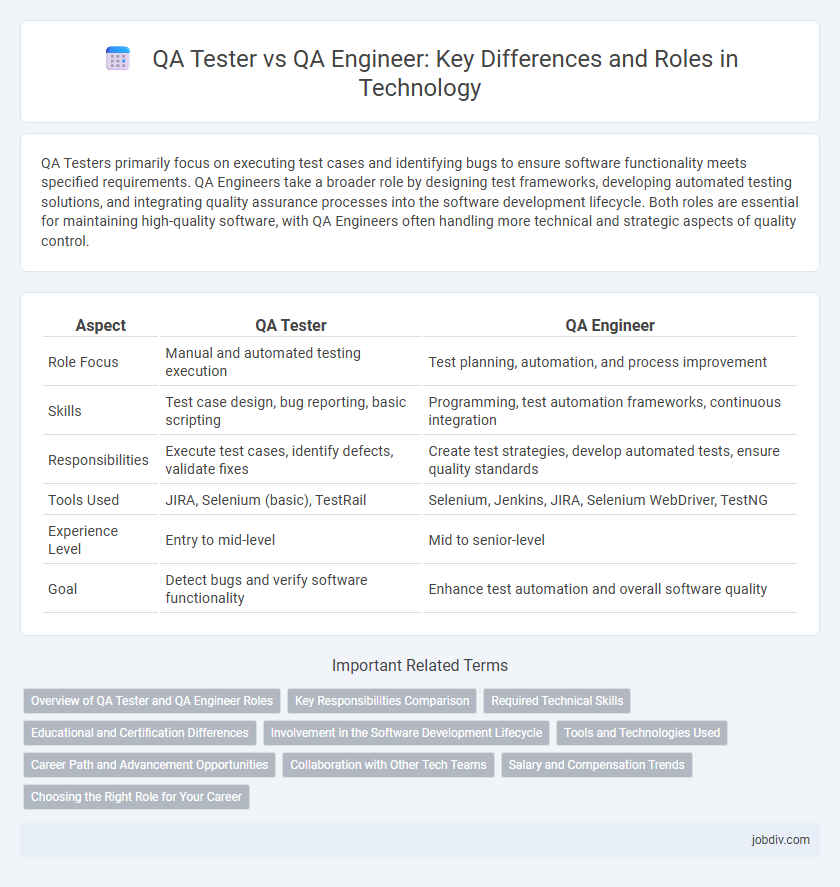QA Testers primarily focus on executing test cases and identifying bugs to ensure software functionality meets specified requirements. QA Engineers take a broader role by designing test frameworks, developing automated testing solutions, and integrating quality assurance processes into the software development lifecycle. Both roles are essential for maintaining high-quality software, with QA Engineers often handling more technical and strategic aspects of quality control.
Table of Comparison
| Aspect | QA Tester | QA Engineer |
|---|---|---|
| Role Focus | Manual and automated testing execution | Test planning, automation, and process improvement |
| Skills | Test case design, bug reporting, basic scripting | Programming, test automation frameworks, continuous integration |
| Responsibilities | Execute test cases, identify defects, validate fixes | Create test strategies, develop automated tests, ensure quality standards |
| Tools Used | JIRA, Selenium (basic), TestRail | Selenium, Jenkins, JIRA, Selenium WebDriver, TestNG |
| Experience Level | Entry to mid-level | Mid to senior-level |
| Goal | Detect bugs and verify software functionality | Enhance test automation and overall software quality |
Overview of QA Tester and QA Engineer Roles
QA Testers primarily focus on executing test cases and identifying defects in software applications to ensure functionality aligns with requirements. QA Engineers take a broader approach by designing test frameworks, automating testing processes, and integrating quality assurance practices within the development lifecycle. Both roles collaborate closely to enhance software quality, but QA Engineers typically possess stronger programming skills and involvement in development methodologies.
Key Responsibilities Comparison
QA Testers primarily focus on executing test cases, identifying bugs, and ensuring software functionality meets requirements through manual or automated testing. QA Engineers take a broader role by designing test strategies, developing automated testing frameworks, and collaborating with development teams to improve overall software quality and reliability. The distinction lies in QA Engineers' involvement in planning and process improvement, while QA Testers concentrate on test execution and defect reporting.
Required Technical Skills
QA Testers require proficiency in manual testing techniques, test case design, and familiarity with tools such as Selenium, JIRA, and Postman for bug tracking and API testing. QA Engineers need advanced knowledge of automation frameworks like Selenium WebDriver, programming languages such as Java, Python, or C#, and continuous integration tools including Jenkins or GitLab CI for streamlined testing processes. Both roles demand strong understanding of software development life cycle (SDLC), defect lifecycle, and version control systems like Git to maintain code quality and test integrity.
Educational and Certification Differences
QA Testers typically hold certifications like ISTQB Foundation Level or Certified Software Tester (CSTE), emphasizing foundational testing skills. QA Engineers often pursue advanced certifications such as ISTQB Advanced Level Test Analyst or Certified Agile Tester (CAT), reflecting deeper knowledge in test design and automation. Educationally, QA Engineers usually possess a background in computer science, software engineering, or related fields, while QA Testers may come from varied educational backgrounds with practical testing experience.
Involvement in the Software Development Lifecycle
QA Testers primarily focus on executing test cases and identifying defects during the testing phase, ensuring the final product meets quality standards. QA Engineers engage throughout the Software Development Lifecycle (SDLC), participating in test planning, requirement analysis, automation development, and continuous integration processes. Their broader involvement promotes early detection of issues, enhancing software reliability and accelerating release cycles.
Tools and Technologies Used
QA Testers primarily utilize manual testing tools like Selenium, JIRA, and Postman to identify defects and ensure software quality, focusing on executing test cases and reporting bugs. QA Engineers leverage automation frameworks such as Selenium WebDriver, Appium, Jenkins, and TestNG, integrating continuous integration/continuous deployment (CI/CD) pipelines to develop robust test scripts and improve testing efficiency. Proficiency in programming languages like Java, Python, or JavaScript is essential for QA Engineers to build scalable automated test frameworks and enhance overall test coverage.
Career Path and Advancement Opportunities
QA Engineers typically have broader responsibilities, including designing test frameworks and automating test processes, which opens pathways to roles like Test Architect or QA Manager. QA Testers often start with manual testing tasks and can progress by gaining automation skills and domain expertise to transition into QA Engineer positions. Career advancement for QA Engineers generally offers higher salary potential and leadership opportunities due to their technical depth and strategic involvement in software development lifecycle.
Collaboration with Other Tech Teams
QA Testers collaborate closely with developers and product managers to ensure software functionality meets design specifications through detailed test case execution. QA Engineers engage more deeply with cross-functional teams, including DevOps and architects, to integrate automated testing frameworks and continuous integration processes. Both roles prioritize clear communication and feedback loops to enhance product quality and accelerate development cycles.
Salary and Compensation Trends
QA Engineers typically command higher salaries than QA Testers due to their broader responsibilities encompassing test automation, framework development, and integration with DevOps practices. Salary data from Payscale and Glassdoor indicate that QA Engineers earn an average base salary ranging from $75,000 to $110,000 annually, whereas QA Testers average between $50,000 and $75,000. Compensation trends show increasing demand for QA Engineers skilled in automation and performance testing, leading to premium pay and enhanced benefits packages in tech hubs like Silicon Valley and Seattle.
Choosing the Right Role for Your Career
QA Testers primarily focus on executing test cases and identifying software defects, making their role essential for validating functionality and usability. QA Engineers design comprehensive testing frameworks, automate processes, and integrate quality into the development lifecycle, requiring a deeper understanding of software development and systems architecture. Choosing between these roles depends on your technical skills and career goals, where QA Testers suit those starting in quality assurance, while QA Engineers align with professionals seeking advanced responsibilities and technical challenges.
QA Tester vs QA Engineer Infographic

 jobdiv.com
jobdiv.com